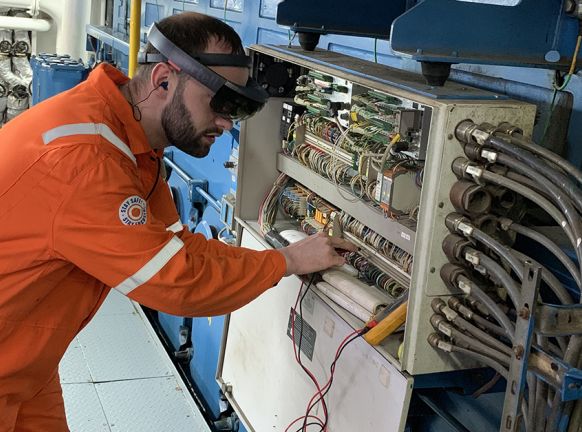After a successful pilot, system integrator Bakker Sliedrecht and gas shipping company Anthony Veder intend to enter a partnership to provide ships with remote service through augmented reality glasses (AR-glasses). Via a computer, service engineers of Bakker Sliedrecht can see live on board footage of the AR-glasses wearer.
Successful pilot gas tanker Coral Favia
The companies have run a successful pilot on gas tanker Coral Favia. During the pilot, functionalities were tested via a dial-up connection and common failures were simulated. On board, an officer wore the AR glasses, guiding Bakker Sliedrecht experts virtually through the ship. “Normally, emails and construction plans are sent back and forth first and phone calls are made to get to the core problem. Now we can watch live. We can solve the problem immediately, or we know what’s going on and we can make a better planning and bring the right parts directly with us.” says Thijs van Hal, Head of Main Contracting at Bakker Sliedrecht.
“Now it can happen that a colleague is travelling for several days, while afterwards it turned out that the solution for the malfunction was relatively easy. As downtime for ships is very expensive, quick service is important. If you can offer them remote assistance through AR glasses, you can be ready in two hours instead of two days,” says Thijs. Anthony Veder has a fleet of over thirty vessels transporting liquified gas on a worldwide scale.
Live images on board
All kinds of digital information can be projected or added to the screen on the glasses. This varies from construction plans, virtual arrows to a 3D impression of the engine room or the switch box. Computer screens on the glasses can also be shared. It is a kind of webcam on site, where you both see the same thing and where you have multiple additional tools to make an accurate assessment of the situation. “It is a very useful tool when there are problems on a ship far away. You can see together what is the problem and how you can solve it,” says Wouter Boogaart, Digital Development Manager at Anthony Veder. The AR glasses can also be used for tests and remote inspections.
Next step in maritime servicing
According to Van Hal, this type of remote assistance technology will become more important as ships are becoming more and more complex. “We will do more things remotely. Then it is important that we are already successful with this,” he says.
Anthony Veder wants to expand the deployment of the AR glass in phases over a part of the fleet. In addition to purchasing AR glasses, staff will be trained and the IT infrastructure will be upgraded. “We believe that these kinds of developments are the future. Ships are becoming increasingly complex. As a result, much more expertise and specialism is needed to see what is going on. Something that is often not present on board. The glasses can save a lot of time, travel time and money, which is why the investment is worth it,” says Boogaart. “Especially during Corona times, the glasses are a useful tool because borders are closed and planes stay on the ground. Then these kinds of innovations have proven to be necessary.”

